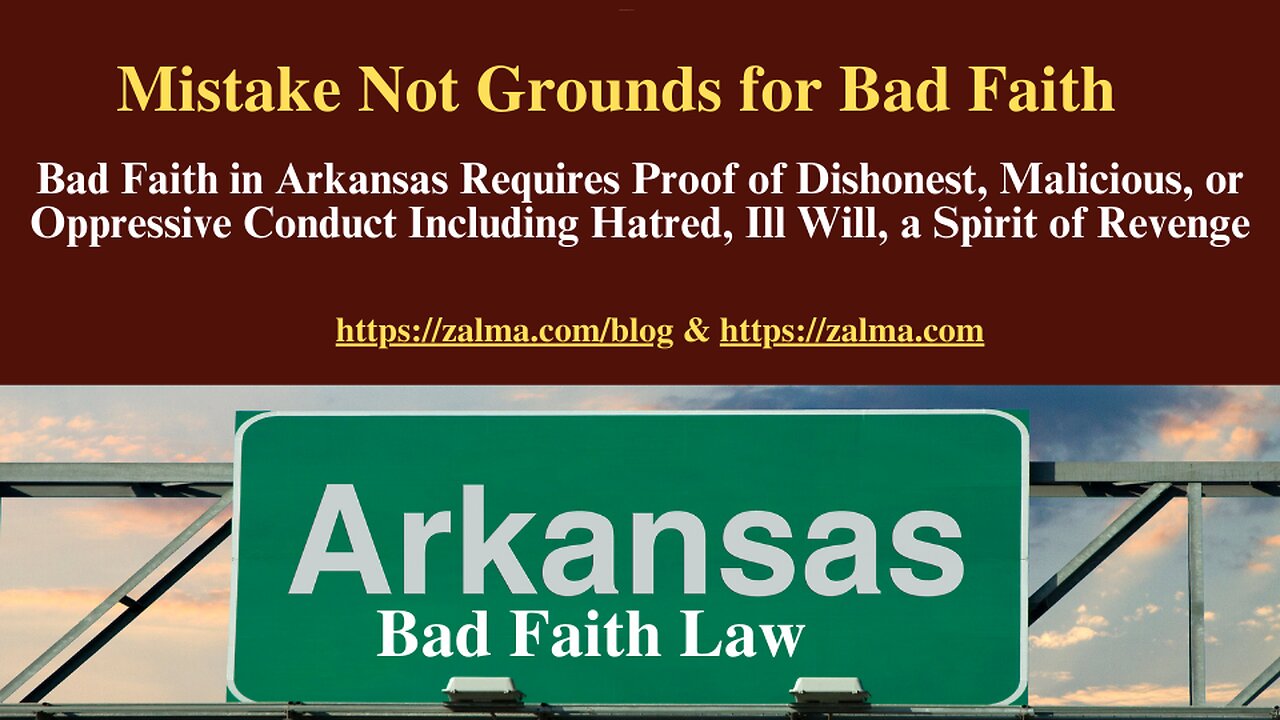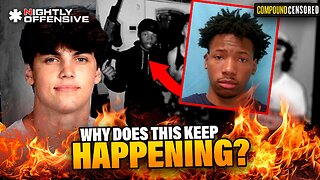Premium Only Content

Mistake Not Grounds for Bad Faith
Bad Faith in Arkansas Requires Proof of Dishonest, Malicious, or Oppressive Conduct Including Hatred, Ill Will, a Spirit of Revenge
Owners Insurance Company moved for summary judgment as to a claim of bad faith. Separately, Owners argued the Court should make a finding that there no evidence to support a punitive damages instruction.
In RMS Warehouse 1315, LLC v. Owners Insurance Company, No. 5:22-CV-5114, United States District Court, W.D. Arkansas, Fayetteville Division (July 7, 2023) the USDC resolved the bad faith issue.
BAD FAITH
The tort of bad faith is established in Arkansas when an insurance company affirmatively engages in dishonest, malicious, or oppressive conduct in order to avoid a just obligation to its insured. The tort requires evidence of a state of mind characterized by hatred, ill will, or a spirit of revenge. Importantly, bad faith does not arise from a mere denial of a claim; there must be affirmative misconduct.
Plaintiff RMS contends its two claims of loss should have been covered under the policy of insurance it had with Owners. The first loss occurred on May 4, 2020, following a hailstorm that caused damage to RMS's warehouse. The second loss was in February 2021, after a winter storm event. RMS narrows its bad-faith claim to Owners's treatment of the winter-storm claim and explicitly states that Owners did not act in bad faith with respect to the hailstorm claim.
The only evidence RMS cited in support of its bad-faith claim is the denial letter sent by insurance adjuster Brian Doherty. RMS believes Mr. Doherty “misrepresented” in the letter what the insurance policy actually provided and omitted reference to crucial portions of the policy that provided coverage.
The standard for establishing a claim for bad faith is, and always should be, rigorous and difficult to satisfy. RMS betrayed a fundamental misunderstanding about the tort when, at one point in its briefing, it characterizes Owners' actions as “[a]t best... a mistake,” Neither a mistake nor a “refusal to pay a disputed claim” is tortious behavior according to Arkansas law.
Summary judgment on Count II, the tort of bad faith, was therefore granted. As a consequence, RMS is not entitled to a punitive damages instruction.
The Motion was granted as to Count II, and the claim of bad faith was dismissed with prejudice; as a result, RMS will not be entitled to an instruction on punitive damages.
ZALMA OPINION
Acting as its own worst enemy the insured's brief admitted that the insurer erred. A mistake may be sufficient to establish a breach of contract but is insufficient to prove the tort of bad faith and the right to seek punitive damages.
(c) 2023 Barry Zalma & ClaimSchool, Inc.
Please tell your friends and colleagues about this blog and the videos and let them subscribe to the blog and the videos.
Subscribe and receive videos limited to subscribers of Excellence in Claims Handling at locals.com https://zalmaoninsurance.locals.com/subscribe.
Consider subscribing to my publications at substack at https://barryzalma.substack.com/publish/post/107007808
Go to Newsbreak.com https://www.newsbreak.com/@c/1653419?s=01
Follow me on LinkedIn: www.linkedin.com/comm/mynetwork/discovery-see-all?usecase=PEOPLE_FOLLOWS&followMember=barry-zalma-esq-cfe-a6b5257
Daily articles are published at https://zalma.substack.com. Go to the podcast Zalma On Insurance at https://podcasters.spotify.com/pod/show/barry-zalma/support; Follow Mr. Zalma on Twitter at https://twitter.com/bzalma; Go to Barry Zalma videos at Rumble.com at https://rumble.com/c/c-262921; Go to Barry Zalma on YouTube- https://www.youtube.com/channel/UCysiZklEtxZsSF9DfC0Expg; https://creators.newsbreak.com/home/content/post; Go to the Insurance Claims Library – https://zalma.com/blog/insurance-claims-library.
-
 8:36
8:36
Barry Zalma, Inc. on Insurance Law
1 year agoZalma's Insurance Fraud Letter - January 15, 2024
270 -
 LIVE
LIVE
Alex Zedra
56 minutes agoLIVE! VERDANSK!!!!!
267 watching -
 LIVE
LIVE
Precision Rifle Network
1 day agoS4E11 Guns & Grub Live - That's NOT How Any Of This Works
127 watching -
 LIVE
LIVE
iCheapshot
1 hour agoWhere We Landing Boys! | Warzone Verdansk is Back Yeerrr
224 watching -
 LIVE
LIVE
AlaskanBallistics
11 hours agoI Love this Gun PodCast # 24
46 watching -
 DVR
DVR
Slightly Offensive
2 hours ago $2.03 earnedWhite Boy MURDERED: What is the REAL REASON Behind BLACK VIOLENCE? | Nightly Offensive
6.58K1 -
![[PT-ENG] Shitzone, we are BACK! Sem armas, sem aim, sem nada!](https://1a-1791.com/video/fww1/64/s8/1/9/c/6/y/9c6yy.0kob-small-PT-ENG-Shitzone-we-are-BACK.jpg) 3:48:39
3:48:39
Farukzzz
4 hours ago[PT-ENG] Shitzone, we are BACK! Sem armas, sem aim, sem nada!
1.32K1 -
 24:27
24:27
Clownfish TV
1 hour agoSnow White Just ENDED 'Woke' Hollywood Forever?!
3.75K6 -
 17:06
17:06
Melonie Mac
5 hours agoIndie Game MUST Play: Dredge
4.34K7 -
 LIVE
LIVE
VOPUSARADIO
1 day agoPOLITI-SHOCK! "THE WAR FOR AMERICA'S SOUL RAGES ON"!
106 watching